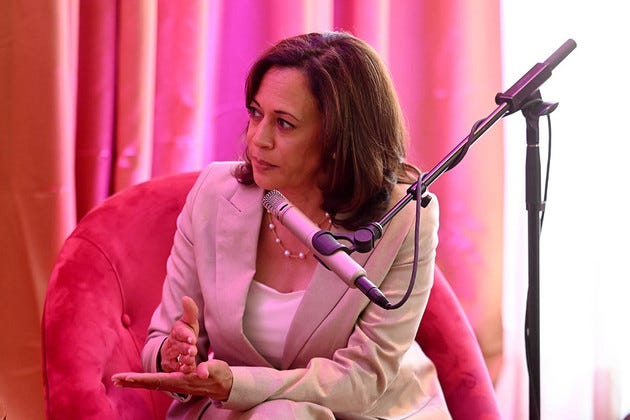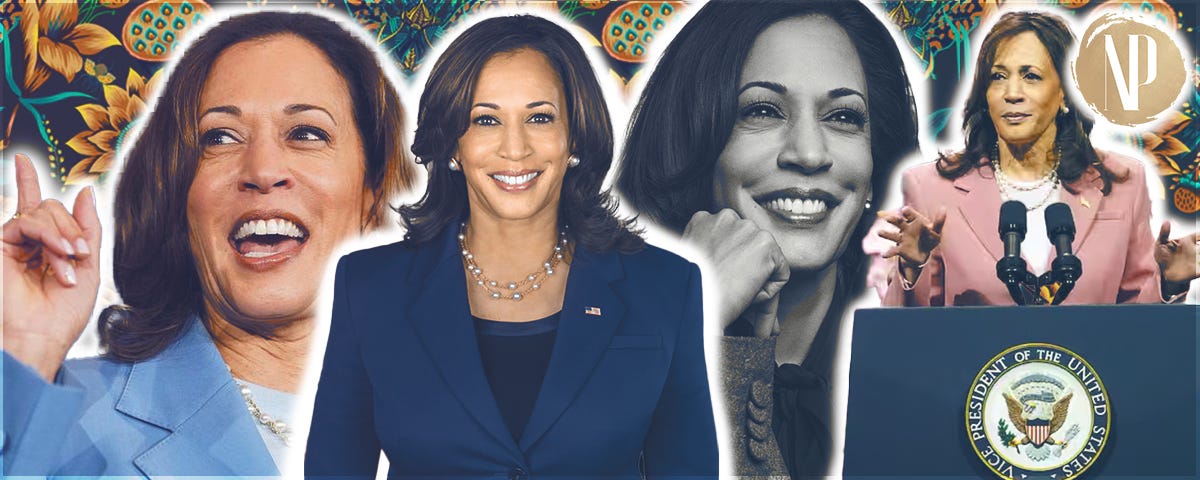JULY is for Kamala Harris: The Re-Ignition of Hope & A Catalyst for Progress
Let's take a look at intersectionality and inclusivity at the heart of a transformative political movement
Elections transcend mere procedural formalities; they represent pivotal moments capable of steering the trajectory of leadership across various echelons. In the context of the United States, casting a vote transcends the simple act of marking a ballot. It embodies a formidable instrument of democracy, wielding the potential to profoundly shape the nation's future, while also underscoring the inherent power vested in the electorate, influencing not just immediate governance but the enduring legacy of political stewardship.
Elected officials wield the authority to make pivotal decisions on critical issues such as healthcare, education, national security, and the economy. The policies they implement can catalyze substantial transformations in these domains, directly influencing the quality of life for citizens. Their governance choices resonate through society, shaping both immediate and long-term socio-economic landscapes, thereby underscoring the profound impact of electoral outcomes on daily life and national progress.
Elections shape the composition of legislative bodies, notably Congress, determining power distribution among political parties. The balance of power is instrumental in influencing the legislative agenda, affecting the nature and scope of laws enacted. The implications of these legislative decisions are vast, ranging from the protection and expansion of civil rights to the structuring of tax regulations. Consequently, the outcome of elections profoundly impacts the legislative landscape by shaping the legal and regulatory framework within which society operates.
Although the right to vote is a fundamental civic duty, it remains susceptible to alteration through legislative actions and electoral decisions. Citizens must remain aware of the legal and political mechanisms that can influence their ability to participate in elections, ensuring that this essential democratic privilege is preserved and accessible to all eligible individuals.
Presidents and certain state governors possess the authority to appoint judges, including those serving on the Supreme Court. These judicial appointments have the potential to mold the legal landscape for generations, influencing landmark decisions on pivotal issues such as abortion, gun rights, and environmental regulations. The long-term impact of these appointments underscores the enduring significance of executive powers in shaping jurisprudence and, consequently, the interpretation and application of laws that affect societal norms and individual rights.

Elected leaders define a country's foreign policy and diplomatic stance, significantly impacting international trade, military alliances, and global diplomacy. Should Vice President Kamala Harris assume the presidency, her tenure could redefine these relationships. Her extensive experience in foreign policy, coupled with her multicultural background, offers a unique vantage point that could infuse international affairs with fresh perspectives. The nuanced understanding of diverse cultures and global dynamics might lead to innovative approaches to fostering international cooperation and addressing global challenges.
The significance of voter responsibility cannot be overstated. Citizens must thoroughly research candidates' platforms, past achievements, and future agendas. An informed electorate not only empowers itself but also ensures that decisions reflect society's collective best interests.
Voting serves as a strong mechanism to hold elected officials accountable. If leaders fail to honor their commitments or act contrary to the public's welfare, voters can replace them in subsequent elections. This accountability ensures that governmental actions meet the populace's expectations and needs. Furthermore, voting ensures representation of diverse views and requirements within the government, enabling citizens to influence the nation's trajectory. By actively participating in elections, citizens help steer policies that directly impact their lives and communities, reinforcing the foundational principle of a government that is truly by and for the people.
With the announcement that President Joe Biden is stepping down from the race and endorsing the Vice President, who has enthusiastically accepted the mantle of responsibility, this election year has taken on unprecedented significance.
Kamala's presidential candidacy marks a transformative moment in the political landscape of the United States (and I bet Shirley Chisholm is proud from the Heavens above!). As the first woman of South Asian and African American descent to seek the presidency from a major U.S. political party, Harris's bid represents a historic breakthrough.
This milestone holds profound significance, symbolically and practically. It sends a resounding message to future generations, challenging entrenched norms and redefining who can aspire to the highest office in the land. Kamala's presence in the presidential race provides a powerful narrative that resonates with young people, especially those from historically underrepresented communities, offering them a beacon of inspiration. Her candidacy underscores the critical importance of diversity and inclusion in leadership, illustrating that political power and leadership are attainable regardless of race or gender.

Moreover, she has a wealth of political experience that she brings to her presidential campaign. Her stint as a U.S. Senator have given her a deep understanding of the legislative process, foreign policy intricacies, and federal governance. Her previous roles as California's Attorney General and District Attorney of San Francisco have provided her with valuable insights into the criminal justice system, establishing her as a strong proponent of significant reforms.
Kamala’s has consistently prioritized issues such as criminal justice reform, healthcare, and climate change – a paramount importance to many Americans. Her advocacy for criminal justice reform is deeply informed by her prosecutorial background, where she has actively pursued changes to rectify systemic inequalities within the justice system. Her experience has driven her to champion policies that aim to reduce mass incarceration, eliminate cash bail, and enhance police accountability, fostering a more equitable legal framework.
Her healthcare policies, for example, are designed to enhance accessibility and affordability, addressing a fundamental concern for numerous families nationwide. Her proposals include expanding Medicaid, reducing prescription drug costs, and ensuring comprehensive coverage for pre-existing conditions, striving to create a more inclusive and efficient healthcare system.
Regarding climate change, Kamala’s staunchly supports ambitious plans to transition to renewable energy and significantly reduce carbon emissions. Her stance on environmental sustainability aligns with the increasing public demand for decisive action to combat climate change. Her advocates for investments in green infrastructure, clean energy jobs, and stringent environmental regulations to safeguard the planet for future generations.

This shift in discourse, or “political” move, is pivotal because it shapes public opinion and can precipitate concrete policy changes. When a presidential candidate, who happens to be the Vice President, prioritizes specific issues, it signals to voters and other politicians that these matters are critical and merit focused attention. And, if executed well, can initiate a domino effect and encourage more candidates and elected officials to adopt similar stances, fostering a broader consensus, and leading to eventual legislative action.
Taking everything into consideration, Kamala's presidential candidacy has the potential to substantially alter public discourse and policy priorities in the United States. Her presence in the race alone draws critical attention to issues that might otherwise be marginalized or insufficiently emphasized. Harris can significantly influence the national conversation by foregrounding topics such as racial justice, healthcare reform, and climate action, ensuring these crucial matters occupy a prominent place on the political agenda.
Her candidacy transcends being merely a historical milestone; it catalyzes transformative change and symbolizes hope for a more inclusive and representative political system. By amplifying pivotal issues, Harris can drive substantive progress and inspire future generations to engage actively in the political process, thereby fostering a more equitable and just society.
References:
Hill. (2024, July 24). Harris vs. Trump polls - The Hill and DDHQ. The Hill. https://elections2024.thehill.com/national/harris-trump-general/
Jha, L. K. (2024, July 24). Trump campaign acknowledges impact of Kamala’s entry. Rediff. https://www.rediff.com/news/report/trump-campaign-acknowledges-impact-of-kamalas-entry/20240724.htm
Kamala Harris Biography. (n.d.). Kamala Harris Biography. https://www.womenshistory.org/education-resources/biographies/kamala-harris
Mills, R. (2024, July 15). Remember Kamala Harris’s dismal presidential campaign? National Review. https://www.nationalreview.com/news/remember-kamala-harriss-dismal-presidential-campaign/#:~:text=URL%3A%20https%3A%2F%2Fwww.nationalreview.com%2Fnews%2Fremember,100
Us, T. C. W. (2022, October 26). Will Kamala Harris run for president in 2024? Theweek. https://theweek.com/feature/briefing/1017650/will-kamala-harris-run-for-president-in-2024



It has been the journey of Black peoples that propelled America into any kind of simulation of greatness. As the Black kinship goes, so goes America